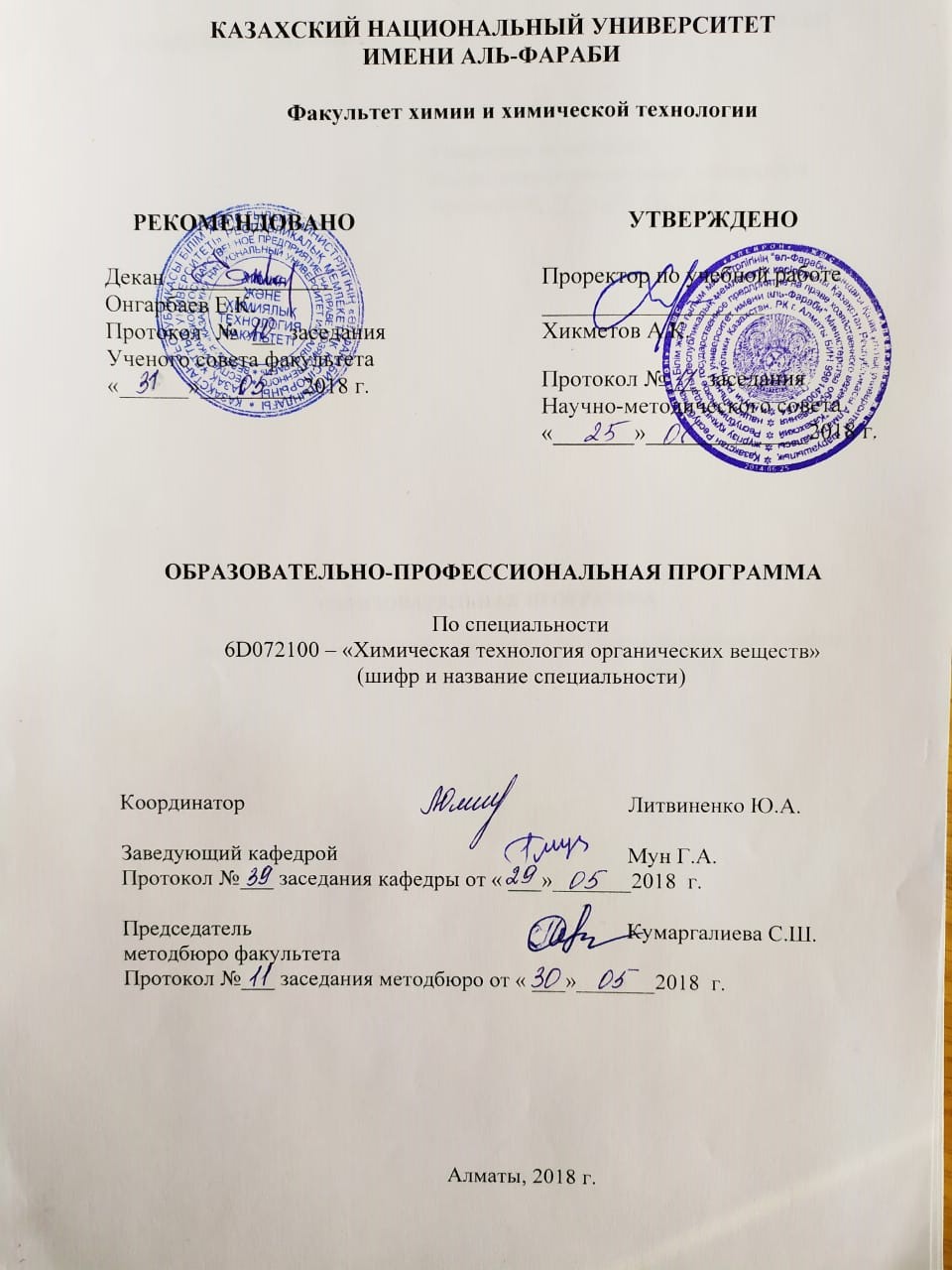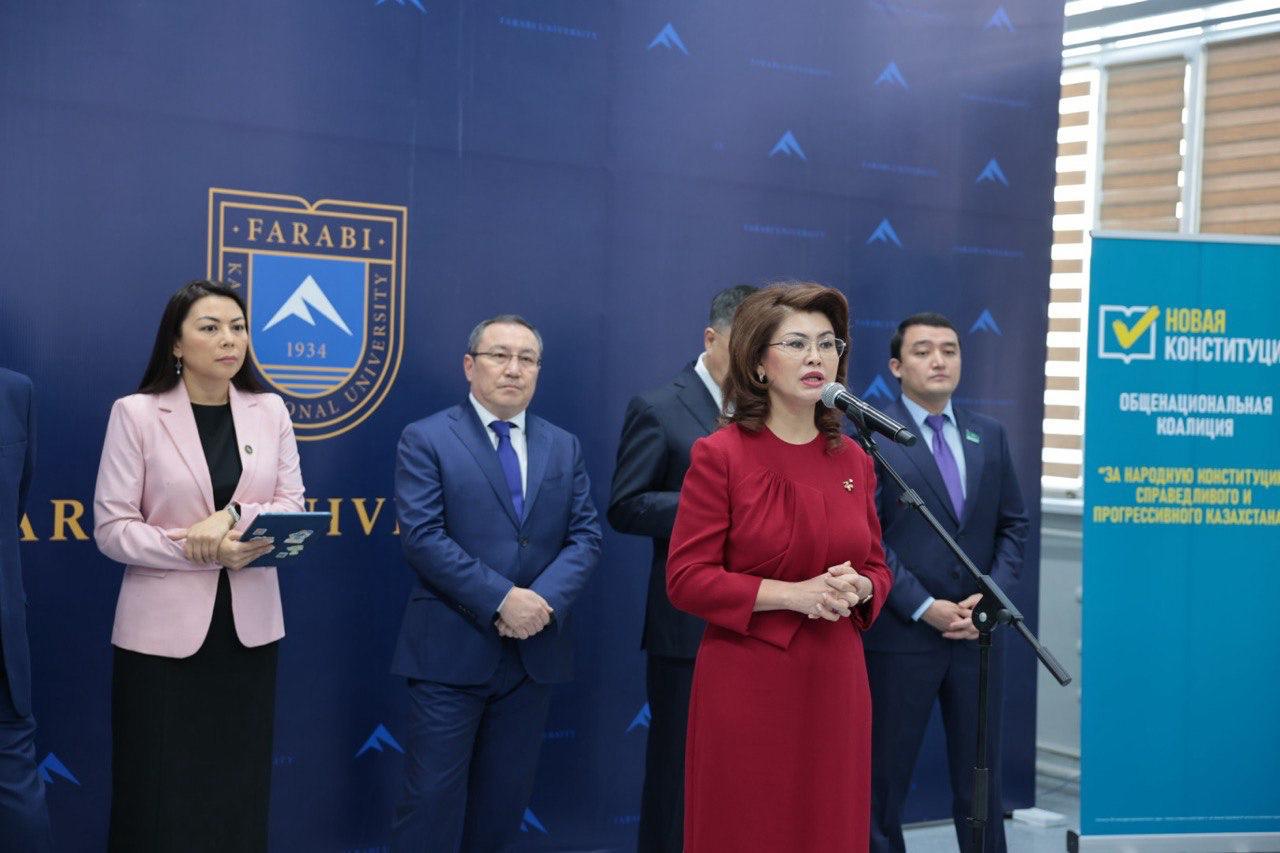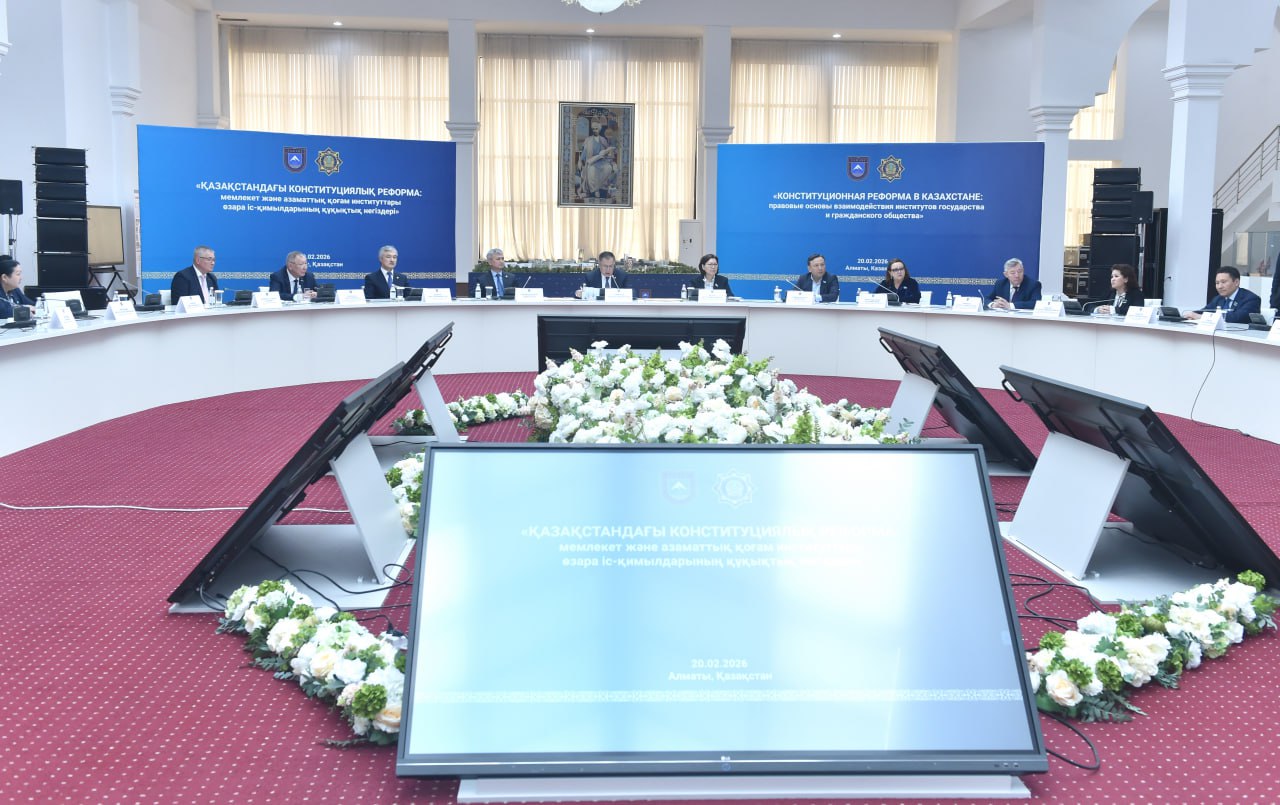
EDUCATIONAL PROFESSIONAL PROGRAM
for the specialty
6D072100 – «Chemical Technology of Organic Substances»
(code and name of specialty)
|
Сoordinator |
|
Yu. A. Litvinenko |
|
|
|
|
|
Head of the Department |
|
G. A. Mun |
|
Protocol № ___ of the department meeting from "___" _______ 2018 |
||
|
|
|
|
|
Chairman of the Faculty |
|
S.Sh. Kumargaliyeva |
|
Protocol № ___ of the methodical bureau meeting from "___" _______ 2018 |
||
Almaty, 2018
AL-FARABI KAZAKH NATIONAL UNIVERSITY
Approved at the meeting of
The Scientific and Methodological Council of the University
Protocol, №____ «___»____2018.
EDUCATIONAL PROGRAM
For the specialty 6D072100 – Chemical Technology of Organic Substances
Almaty, 2018
Coordinator
|
Litvinenko Yu.А.
|
||
|
Developers |
|
Turmukhanova M.Zh.
Korulkin D.Yu.
Seitimova G.A.
|
PASSPORT
OF THE EDUCATIONAL PROGRAM
OF PhD DOCTORAL STUDIES
For the specialty 6D072100 - Chemical Technology of Organic Substances
Level of education 7
Under the training route scientific and pedagogical
Assigned Degree Doctor (Ph.D.) in
6D072100 - Chemical Technology of Organic Substances
1. General characteristics of the educational program
|
1.1 Purpose and mission of EP |
Mission: Formation of personnel potential - highly qualified specialists competitive in the domestic and international labor market in accordance with their needs and development prospects of the country and region. The purpose of the educational program for the specialty "6D072100 - Chemical Technology of Organic Substances" is to provide training for competitive specialists with sufficient knowledge, able to absorb new knowledge objects, as well as generate new knowledge in the field of chemistry and chemical technology of organic substances and materials of synthetic and natural origin, to solve issues of improving the technology of organic substances and polymers in accordance with current global trends; to formulate production tasks in a professional language and solve them with the help of modern technologies; having an active civil position that based on the ideas of peace, goodness and justice |
|
1.2 Basic indicators of EP
|
Type of EP: PhD Doctora Terms of EP: 3 years Forms of education: full-time Theoretical study: 15 credits |
|
1.3 Brief characteristic of EP. |
The present program for the specialty "6D072100 - Chemical Technology of Organic Substances" is compiled in accordance with the requirements of foreign universities. The educational program is built on a modular basis based on the competence approach. The following training routes for the specialty are provided: 1. 6D072101 Chemical Technology of Synthetic Organic Substances 2. 6D072101 Chemical Technology of Natural Compounds 3. 6D072101 Chemical Technology of Polymeric Materials |
|
2. Qualification requirements in the format of learning outcomes |
|
|
2.1 Expected learning outcomes of EP |
Upon completion of this program, it's expected that students will be able to: 1. demonstrate the skills of research activities, solving standard scientific problems; 2. interpret the results of experimental methods; 3. find a way of expression for the original development and application of ideas in the context of scientific research; critically analyze existing concepts, theories and approaches to the analysis of processes and phenomena; integrate knowledge gained in various disciplines to solve research problems in new unfamiliar conditions; 4. evaluate judgments and make decisions based on incomplete or limited information in the field of technological problems; 5. develop a research methodolog in the field of scientific and pedagogical activity in higher educational institutions and ensuring the continuous updating of knowledge, expansion of professional skills and abilities. 6. analyze and solve modern scientific and practical problems, organize and conduct research and innovation activities in the chosen scientific specialty; 7. use the knowledge gained for the original development and application of ideas in the context of scientific research; 8. demonstrate the ability to carry out information-analytical and information-bibliographic work with the involvement of modern information technologies; 9. critically evaluate existing concepts, theories and approaches to the analysis of processes and phenomena; integrate knowledge gained in various disciplines to solve research problems in new unfamiliar conditions; by integrating knowledge, make judgments and decisions based on incomplete or limited information; 10. apply modern trends in the development of chemistry and chemical technology of hydrocarbons; modern approaches, strategies and methods for molecular modeling of new synthetic drugs and organic compounds with desired properties; interrelations "structure - property" of organic substances; 11. to evaluate and creatively approach to the solution of new problems and situations; summarize the results of research and analytical work in the form of a thesis, scientific article, report, analytical note, etc.; 12. make decisions and argue them when solving a problem in the technological field. |
|
2.2 Expected outcomes on each module of EP |
|
|
Module " Complex processing of hydrocarbon raw materials" |
Upon successful completion of this module, students should be able: 1. to form a systemic understanding of the theoretical and experimental aspects of studying the methodology and research methods in the field of complex processing of hydrocarbon raw materials; 2. to create, develop and adapt innovative projects in the field of oil refining to a specific region; 3. to interpret the results of research in the field of complex processing of hydrocarbons; 4. to summarize the results of experimental data and explain the causes of certain errors in the technological process of processing; 5. to analyze and evaluate existing technologies for the processing of hydrocarbons; 6. to differentiate the methodology and methods of processing hydrocarbon raw materials, depending on the nature and composition; 7. to generate new ideas and techniques to improve the efficiency of the processing of hydrocarbon raw material; 8. to recommend the development of original methodologies and research methods that expand the scope of traditional, dominant areas and concepts in the field of deep hydrocarbons processing. |
|
Module "Modern Trends in the Chemistry of Polymer Materials"
|
Upon successful completion of this module, students should be able: 1. to reproduce the theoretical and experimental aspects of the methodology and research methods in the field of chemistry and technology of polymeric materials and compositions; 2. to select and adapt innovative projects in the field of creating polymeric materials for industrial use to a specific region; 3. to interpret new ideas and trends in the field of creation new polymeric materials and compositions with a wide range of practically useful properties; 4. to use the gained knowledge for conduct a dialogue in the field of chemistry and technology of organic substances and polymeric materials with an equal in status scientific community; 5. to compare the technological development of polymer chemistry at the level of world standards within the framework of academic and professional competencies; 6. to identify the similarities and differences in the technology of creation polymeric materials depending on the scope of their use; 7. to generate ideas through the development of original methodologies and methods for creation innovative polymer forms that expand the scope of existing trends and concepts. 8. to discuss and compare existing technologies for the production of polymeric materials and choose the most efficient way to create polymeric materials with desired properties. |
|
Module "Chemistry and Biological Functions of Organic Substances"
|
Upon successful completion of this module, students should be able: 1. to reproduce the understanding of the theoretical and experimental aspects of studying modern trends in the research of the functions of organic substances of various modifications in biological objects; 2. to discuss and adapt to a specific region innovative projects in the field of creation organic materials that can have a targeted effect on bioreceptors; 3. to evaluate new syntonic approaches to the creation of new biologically active substances and compositions for targeted and successful impact on biological objects; 4. to adapt to a certain field of activity innovative developments in the field of creation biologically active organic substances that significantly improve their physiologically active properties; 5. to promote the development of practically useful organic substances and materials at the level of world standards and discuss the results with the equal in status scientific community; 6. to compare the structure of organic matter with its effect on biotargets and to develop the technological scheme of targeted synthesis of biologically active substances; 7. to argue the choice of original methodologies and methods for creation innovative forms of organic materials, expanding the scope of existing areas and concepts in the field of chemical technology of bioactive organic substances and materials. |
|
Module "Innovative Methods of Organic Substances Analysis" |
Upon successful completion of this module, students should be able: 1. to analyze the theoretical and experimental aspects of modern methods of analysis of organic substances and materials; 2. to argue the choice of methodology and method of analysis of a practically useful organic compound; 3. to practice the use of the optimal method of analysis, which allows the most fully characterize the studied organic sustance; 4. to interpret the results of the analysis and discuss them with the equal in status scientific community; 5. to evaluate new ideas and trends in the field of creation new methods for the identification of organic substances; 6. to evaluate control methods in the technological scheme of the production of organic substances and materials; 7. to promote the development of product quality control methods within the framework of academic and professional competencies; 8. to generate new approaches and apply a wide range of skills in the field of analysis practically useful organic substances and materials. |
|
Module "Structurally Oriented Design of Biologically Active Organic Compounds" |
Upon successful completion of this module, students should be able: 1. to demonstrate a systematic understanding of the theoretical and experimental aspects of studying modern methods of creation biologically active organic compounds and quality control that meets the requirements of modern methods of standardization, certification and validation; 2. to argue the choice of the method of creation a structure that potentially has biological activity; 3. to adapt to a certain field of activity innovative developments in the field of creation of biologically active substances and materials that meet international standards for quality; 4. to compare the well-known and innovative methods of molecular design of biologically active organic substances and compositions; 5. to evaluate new ideas and trends in the field of creation new methods for constructing organic objects with desired properties; 6. to argue the choice of the method of obtaining synthetic drugs and pesticides and conduct an equivalent dialogue in the field of creation and production 7. to discuss and defend their own point of view in the field of the design of a practically useful organic compound in a dialogue with an equal in status scientific community; 8. to apply a wide range of skills in the field of design of new biologically active organic substances and materials, based on the analysis of the latest achievements of the research the pattern “structure - biological activity”. |
|
"Module of professional practice" |
Upon successful completion of this module, students should be able: 1. to systematize and analyze the material obtained during the practice; 2. to conduct experiments and discuss their results in the pedagogical community; 3. evaluate the latest achievements in the field of chemical research and chemical technology; 4. to use theoretical knowledge and experimental skills for self-planning and conducting an experiment, analyzing and formalizing obtained results; 5. to use interactive forms of education; 6. to draw up and compare the daily work plan on the topic of the thesis; 7. to acquire and improve experimental and instrumental skills; 8. to analyze the results of the experiment, present the results of research work in the form of a report and defend the results of research work in the scientific community. |
2.3 Matrix of competencies formation on the educational program modules
|
Module name |
Learning outcomes on the program |
|||||||||||
|
1 |
2 |
3 |
4 |
5 |
6 |
7 |
8 |
9 |
10 |
11 |
12 |
|
|
Complex processing of hydrocarbon raw materials |
А1 |
А2 |
А3 |
|
В2 |
В3 |
|
|
С1 |
С2 |
С3 |
D |
|
Modern trends in chemistry of polymeric materials |
А1 |
|
А3 |
|
В2 |
В3 |
|
|
С1 |
С2 |
С3 |
D |
|
Chemistry and biological functions of organic substances |
А1 |
|
А3 |
|
|
|
|
|
С1 |
С2 |
С3 |
D |
|
Innovative methods of analysis of organic substances |
А1 |
|
А3 |
|
|
|
B4 |
B5 |
С1 |
С2 |
С3 |
D |
|
Structure-based design of biologically active organic compounds |
А1 |
|
А3 |
В1 |
В2 |
|
|
|
С1 |
С2 |
С3 |
D |
|
Professional practice module |
|
А2 |
А3 |
В1 |
В3 |
В3 |
|
B5 |
С1 |
С2 |
С3 |
D |
|
PhD student’s research work |
|
А2 |
А3 |
|
В3 |
В3 |
|
|
С1 |
С2 |
С3 |
D |
3. Analysis and needs of the labor market for graduates of given EP |
For the future employment of program graduates, key employers for the specialty 6D072100 - Chemical Technology of Organic Substances are: Al-Farabi Kazakh National University (Almaty); S. Amanzholov East Kazakhstan State University (Ust-Kamenogorsk); JSC "A.B. Bekturov Institute of Chemical Sciences"(Almaty), JSC "D.V. Sokolsky Institute of Organic Catalysis and Electrochemistry" (Almaty), Institute of Plant Biology and Biotechnology (Almaty); Institute of Botany and Phytointroduction (Almaty); National Center for Expertise of Medicines, Medical Devices and Medical Equipment of the Ministry of Health of the Republic of Kazakhstan (Almaty), LLP "Rauan Nalco" (Atyrau), LLP "Zerde-FITO" (SKO, Shymkent), LLP "Karachaganak Petroleum Operating B.V. ”(WKO, Aksai), "Production Company"Dorplast-invest" LLP (v. Zarechnoye, Almaty Region), JSC Holding "PhytoChemistry" (Karaganda). The educational program is relevant for a specific field of employment 1. Chemical industry 2. Pharmaceutical industry 3. Higher education institutions 4. Research institutes and divisions. |
|
4. Professional activity domains of EP graduate |
|
|
4.1 Planned areas of graduate professional activity. |
Personnel training for the specialty 6D072100 - Chemical Technology of Organic Substances is carried out for the following areas of professional activity: educational; scientific; health care; public administration bodies; industry; building; agriculture. |
|
4.2 Types of professional activities, to which is mainly preparing graduate of EP. |
On specialty 6D072100 - Chemical Technology of Organic Substances there are the following types of professional activity: Teacher; Researcher; Senior Researcher; Technologist; Head or specialist in the field of physical and chemical control of organic substances and materials of chemical and chemical-technological profile; The head of the division in research and production centers, research institutes, the State body of enterprises’ administration and the non-state sector. The head of the division in the Department organizations by the section: chemical, petrochemical, oil refining, oil producing, pharmaceutical, food industry, bodies that control the quality of organic substances and materials. Related professional activities for the specialty 6D072100 - Chemical Technology of Organic Substances are: Medical and biological business; Chemical Plant Protection; Food industry. |
|
5. Description of advantages and features of EP from the viewpoint of positioning on the market of educational services |
The educational program for the specialty 6D072100 - Chemical technology of Organic Substances has passed the international accreditation of the agency ASSIN. According to the results of the rating of the IAAR, the educational program takes the 1st place. The faculty has the following laboratories for the implementation of the educational program: Academician of the National Academy of Sciences of Kazakhstan Tokmurzin K.Kh Laboratory of Organic Synthesis, Dr. Sc., Professor, Torekhanov T.M. Laboratory of Organic Synthesis, Dr. Sc., Professor, Academician of RAS Tolstikova G.A. Laboratory of Natural Products Chemistry and an accredited laboratory of organic synthesis and chemistry of drugs. Laboratories in which research work is planned are equipped with modern equipment for carrying out physical and chemical studies of organic materials. The use of installed equipment allows doctoral students to develop practical skills in the field of sample preparation and analysis in the technological processes of organic substances and materials production, technology for processing of hydrocarbon raw materials, synthetic organic substances, natural compounds and polymeric materials.
Bases of practices: In addition, the university has two research institutes in the field of organic substances (Center for Physical and Chemical Research and Analysis Methods, Research Institute for New Chemical Technologies and Materials). On the basis of these centers, the research practice of doctoral students is conducted, during which they master modern technologies of analysis and production.
Academic Mobility: University of Rostock, Germany; Shanghai Institute of Materia Medica, Chinese Academy of Science (CAS); China, Shanghai, Xinjiang Technical Institute of Physics and Chemistry, CAS, China, Urumqi; University of Mississippi, USA; University of Postham, Germany; Karachi University, Pakistan; Purdu University, USA; University of Reading, UK; University of Khojateppe, Turkey; University of Malaya, Malaysia.
Scientific schools or scientific routes of the department, (scientific projects): 6D072101 Chemical Technology of Synthetic Organic Substances; 6D072101 Chemical Technology of Natural Compounds; 6D072101 Chemical Technology of Polymeric Materials. The department runs 2 international projects: "The study of the biologically active components of Kazakhstan medicinal plants" (Chinese Academy of Sciences); “Developing radiation technology for manufacturing hydrogel wound dressings with antimicrobial activity” (Royal Academy of Engeneering (RAEng), University of Reading) and 7 projects of grant financing of the Ministry of Education and Science of the Republic of Kazakhstan: “New routes for the synthesis of biologically and surfactant heteroatomic cyclic structures based on the products of deep hydrocarbon raw materials processing", "Development and practical implementation of the pilot production technology of new ecologically safe solvent-free acrylate paints with improved characteristics", "Development of technology for obtaining new mucoadhesi medicinal forms based on hydrophilic polymers and their mixtures", "Development of universal, cost-effective methods for the selective isolation of industrially significant classes of biologically active substances from Kazakhstan plants", "Development of technology for the targeted synthesis of new nitrogen- and phosphorus-containing biologically active substances based on natural oxyanthraquinones", "Development of radiation-chemical technology for production of polymer hydrogels for pelleting seeds with protective-stimulating compositions", "Technology of intensifiers production for soils cleaning phytoremediation technology from persistent organic and inorganic pollutants and radionuclides”
Comparison with similar programs of foreign universities: Education for the specialty "Chemical Technology of Organic Substances" is carried out in the universities of 3 countries: in the Republic of Kazakhstan (23 universities), in the Russian Federation (28 universities) and in the Republic of Belarus (2 universities - specialty – “Chemical Technology Organic Substances, Materials and Products"). Consonant, with the specialty 6D072100, but radically different on the training profile, the specialty “Chemical Engineering” is present in the educational programs of 124 universities of the top 200, the QS rating. In mentioned specialty, foreign universities prepare engineering and technical personnel for the creation, maintenance and development of mathematical software for industrial equipment of chemical factories, and the specialty itself is related to physical engineering by the profile of training. From Kazakhstan, Russian and Belarusian universities, providing training in the specialty "Chemical Technology of Organic Substances" ("Chemical Technology of Organic Substances, Materials and Products" in the Republic of Belarus), QS rating includes 7 universities: Al-Farabi Kazakh National University, Tomsk Polytechnic University, St. Petersburg State Technological University, K.I. Satpayev Kazakh National Technical University, Ural Federal University named after the first President of Russia B. N. Yeltsin, M. Auezov South Kazakhstan State University and Kazakh-British Technical University. According to the QS rating, Al-Farabi Kazakh National University provides the most high-quality training of specialists, surpassing in this indicator the following university in the ranking - Tomsk Polytechnic University, over 150 places. |
|
6. Requirements for the enrollee |
Admission to doctoral studies is carried out for educational programs approved by the central authorized agency in the field of education, by branches of science. 1. For Doctoral study are accepted: - persons who have an academic degree "master" ; - persons who have a seniority 3 years. 2. Applicants for a doctoral studies must be fluent in English language. The level of possession of a foreign language can be confirmed by a certificate or other documents issued by domestic or international educational organizations. 3. The admission exam on a foreign language (English) is passing on the technology of standardized testing. 4. The examination in a special discipline in the ammount of the existing programs established for graduates of the master's degree is conducted by subject commissions, the composition of which is approved by the rector of the university.
Related specialties for admission to doctoral studies are: Chemistry, Biology, Food Technology. |


